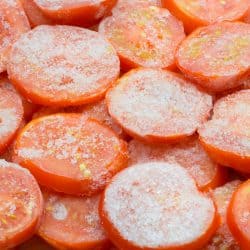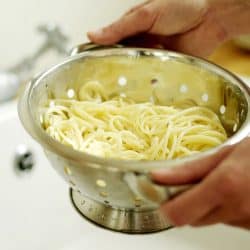You do not want to scorch pasta sauce or not cook it long enough, so you are likely wondering how long it takes to cook it. We researched the appropriate length of time to cook pasta sauce, and we are here to answer your questions.
On average, pasta sauce takes about twenty minutes to cook. The timing slightly varies based on whether your pasta sauce is homemade or seasoned before you bought it.
Keep reading to learn more about whether or not you can overcook pasta sauce, if you should cover pasta sauce while it is simmering, how to thicken it up, and more.
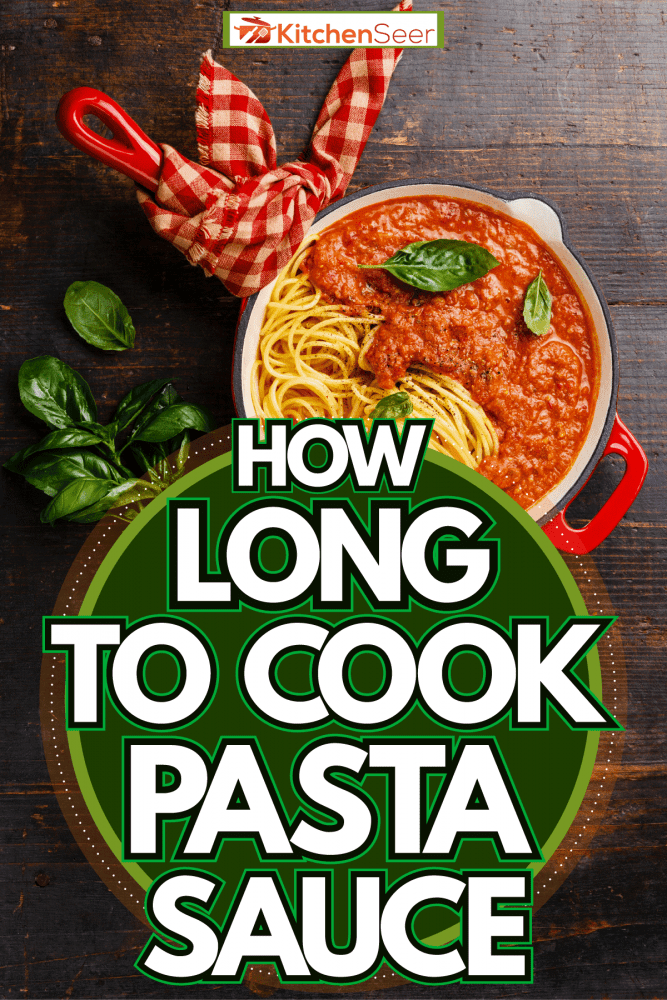
How long should you cook homemade sauce?
How long it takes to cook pasta sauce differs depending on whether you are using a sauce that is already seasoned and ready to be added to your dish or if you are making pasta sauce from scratch. Homemade pasta sauce takes anywhere between one hour and three hours.
Store-bought pasta sauce only takes five or ten minutes on medium to medium-high heat. Pasta sauce that has already been seasoned before you buy it takes about twenty minutes if you let it simmer instead of rushing it. You only need it to be hot enough to serve. Heating store-bought pasta sauce is quick and easy.
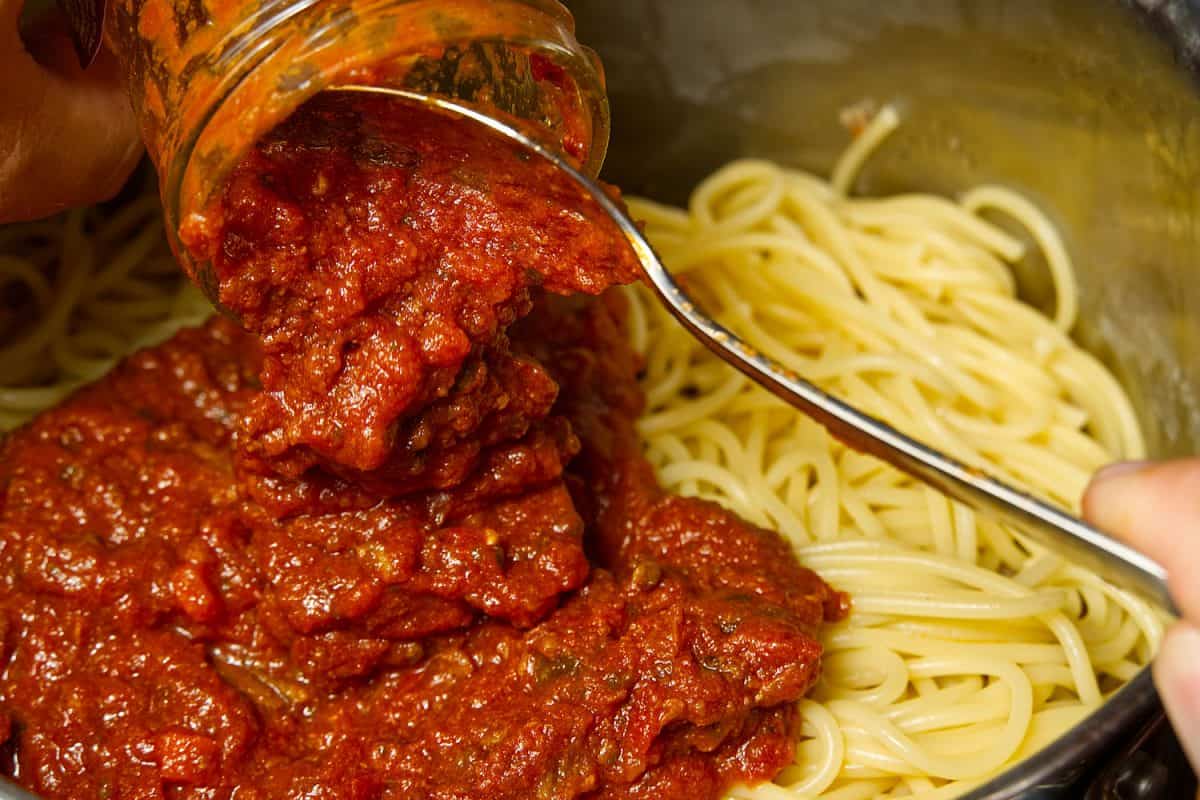
It takes less time to heat homemade pasta sauce if you cook it on a higher setting. The problem with cooking your pasta sauce on a higher heat setting is that you need to stir it consistently and more often than when using a lower heat setting. Adding butter to your pasta sauce will take a few extra minutes, but the butter will also thicken the sauce up.
To avoid potential hazards, it is truly in your best interest to cook the pasta sauce on a lower heat setting. As long as you are not pressed for time, you should let your seasonings meld together before serving your pasta dish. The trick is to heat your pasta sauce until it is bubbling, turn it down to simmer, stir it well, and cover it. Stir the pasta sauce periodically until it is at the desired temperature.
There are some pans available that are ideal for this job. They have a spout built into them, making it easier to pour from. It also doubles as a strainer.
Click here to see this saucepan on Amazon.
Can you overcook pasta sauce?
Yes, you can overcook pasta sauce. The flavor of the pasta sauce becomes less desirable if it is overcooked. Tomatoes can get overcooked, too, so keep that in mind. Taste the sauce as you go to ensure the flavor ends up being how you want it.
You should not let it sit and simmer for too long because it will get too hot, then burn and stick to the bottom of the pan. If you let your pasta sauce burn, it could completely ruin your dish. Well, that is one reason anyway.
Another reason you should not simmer pasta sauce for too long is that it becomes bitter. The reason pasta sauce becomes bitter is that its sugars break down after a few hours of simmering. We do not suggest simmering your pasta sauce for more than three hours for that reason.
Something you can do to prevent the diced tomatoes in your pasta sauce from overcooking is waiting to add them in. If you start making your pasta sauce early and know you will have plenty of time to cook it, you can wait to add the diced tomatoes until one hour before you plan to eat. It is not a necessity but is a precaution to take if you choose.
Do you simmer pasta sauce with lid on or off?
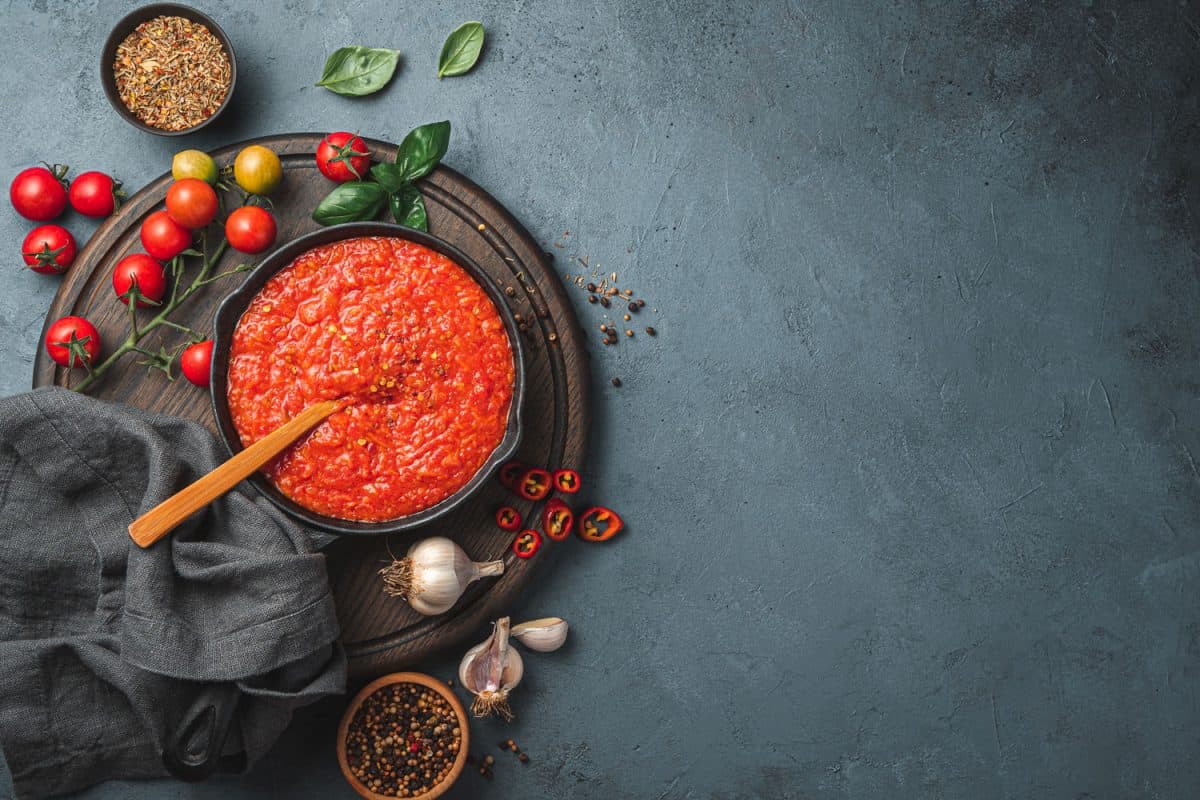
It is always best to simmer your pasta sauce with a lid on. Keep it covered except for when you are occasionally stirring it. The main reasons you should keep a lid on your pasta sauce is to keep the heat in, stop the pasta sauce from bubbling up and popping out, causing a saucy mess on your stovetop.
Another reason you should keep a lid on your pasta sauce is to keep the moisture in. That is unless you need to let the sauce thicken up. Make sure you season your sauce well to yield a flavorful pasta dish.
Using a spoon rest for the spoon you are stirring your sauce can come in handy. These help keep the sauce mess limited. Less mess means less stress for most of us.
Click here to see this spoon rest on Amazon.
Covering your pasta sauce also saves you from stirring quite as often. The lid keeps moisture inside and circulating. In addition, that means it is less likely that you will overcook it with a lid secured on top too.
How do you thicken up tomato sauce?
One of the ways to thicken up tomato sauce is by cooking it longer. Simmer your pasta sauce uncovered when you are trying to thicken it. Doing so allows your pasta sauce to reduce and gives the water a chance to evaporate.
The less time you let your pasta sauce cook, the thinner it will be. Give it time to absorb the flavors of the seasonings you added. A few examples of delicious seasonings that pair well with pasta sauce are oregano, basil, and a little bit of rosemary.
Click here to see this spice rack on Amazon.
Another option for thickening up tomato sauce is by adding a roux. A roux is made of flour and butter. It doesn't take much, but a roux will thicken up sauce or soup, whatever you need it for. You technically do not even need the flour when it comes to thickening pasta sauce.
You can whisk the butter in slowly. This still has the same thickening effect as adding a roux to pasta sauce, but not using any flour takes away the chance your sauce could taste like flour. I think we would all prefer our pasta to not taste like flour. You only need to add about half of a tablespoon of butter.
More Ways to Thicken your Pasta Sauce
You can also thicken tomato sauce by adding a little cornstarch. Always be sure to measure out the right amount of cornstarch. Adding too much cornstarch will cause your pasta sauce to become kind of gummy or jelly-like. Not adding enough cornstarch will not thicken the sauce, so about one teaspoon per cup of sauce should turn out quite well.
Adding cheese such as Parmesan directly into your pasta sauce will thicken your sauce too. You do not have to wait and only top it off. Most people add Parmesan on top of their finished dish. You can add some during the cooking process.
Tomato paste is thicker than tomato sauce. Adding a little tomato paste will thicken your sauce too. Just add a little more seasonings and cook them down because you don't want your pasta sauce to taste too much like tomatoes. It is all about balance.
You will know your pasta sauce is finished cooking when it is the thickness you are going for. Taste test it before you serve it to ensure the flavor is what you want it to be.
Do you pour your pasta sauce onto your pasta?
You should always add your pasta to your pasta sauce. Mix the noodles, and pasta sauce, then let them warm up together for about five minutes. If you do that, it will ensure you have sauce on all of your noodles. Simply putting sauce on your pasta is not the way to make it these days.
Strain your diced tomatoes if you use diced tomatoes from a can in your pasta sauce. If you do not strain the diced tomatoes, your sauce will be more on the runny side. This also means it will take longer to cook. You want your pasta sauce to stick to your pasta but not be watery.
All in All
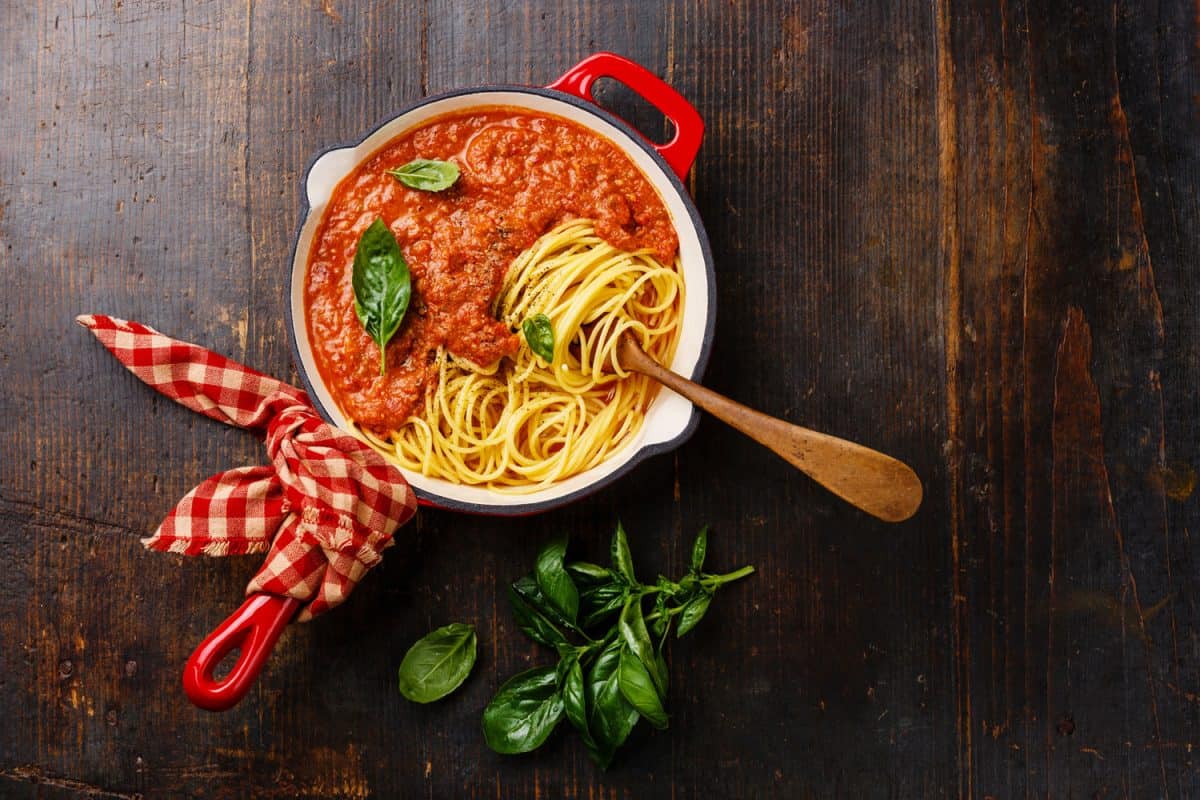
In conclusion, cooking homemade pasta sauce takes longer than store-bought pasta sauce. Homemade pasta sauce should cook for an hour minimum and three hours maximum. Store-bought pasta sauce only takes about fifteen to twenty minutes to heat up, just long enough to get hot. You can thicken your sauce by cooking it longer uncovered, adding a roux, cornstarch, or tomato paste.
Before you go, check out the following links that you might be interested in:
What's The Best Pot For Cooking Pasta?
Does Lasagna Finish With Pasta Or Sauce?
What Tomatoes are Best for Spaghetti Sauce?




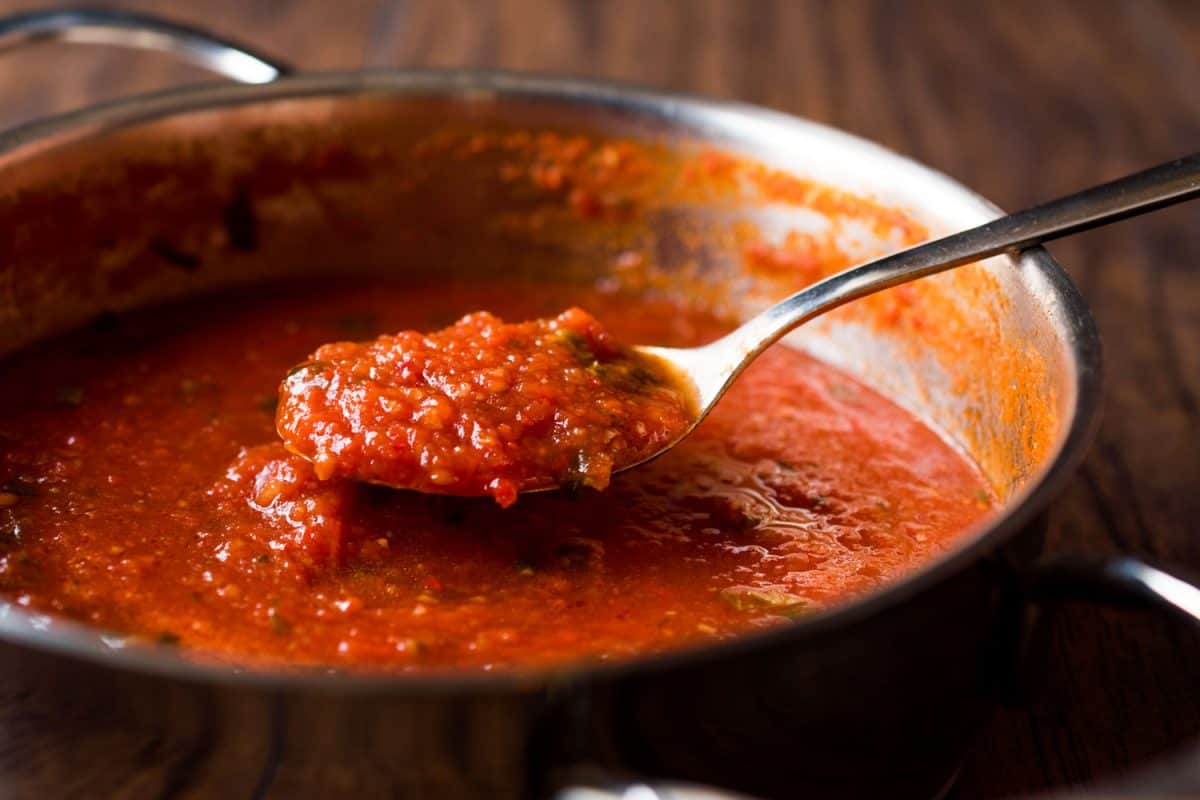


![Oven roasted cherry tomatoes. How Long To Roast Tomatoes [A Look At Various Factors & Considerations]](https://kitchenseer.com/wp-content/uploads/2021/08/Oven-roasted-cherry-tomatoes.-How-Long-To-Roast-Tomatoes-A-Look-At-Various-Factors-Considerations-250x250.png)
